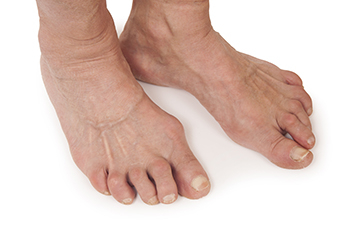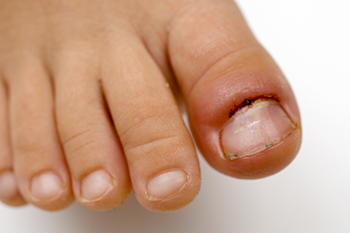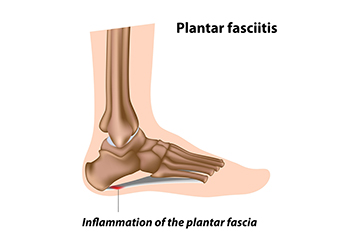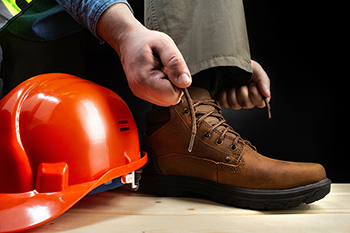Connect With Us
Blog
Items filtered by date: October 2023
Foot Pain and Rheumatoid Arthritis

Managing foot pain associated with rheumatoid arthritis, or RA, is vital for maintaining mobility and quality of life. Podiatric interventions for RA typically focus on a multi-faceted approach that combines medication, exercise, custom orthotics, and sometimes surgical treatments. Medications for rheumatoid arthritis can include anti-inflammatory or disease-modifying antirheumatic drugs to reduce pain. Corticosteroid injections are given for localized foot pain or an affected joint, and can offer temporary relief from inflammation. Custom orthotics are tailor-made shoe inserts that can provide better arch support and cushioning to relieve stress on inflamed joints. In severe cases where deformities have developed, surgical interventions such as joint fusion or joint replacement may be considered. If you suffer from rheumatoid arthritis and it is causing pain in your feet or ankles, it is strongly suggested that you make an appointment with a podiatrist for relief and pain management techniques.
Because RA affects more than just your joints, including the joints in your feet and ankles, it is important to seek early diagnosis from your podiatrist if you feel like the pain in your feet might be caused by RA. For more information, contact one of our podiatrists of Crosstown Podiatry. Our doctors will assist you with all of your podiatric concerns.
What Is Rheumatoid Arthritis?
Rheumatoid Arthritis (RA) is an autoimmune disorder in which the body’s own immune system attacks the membranes surrounding the joints. Inflammation of the lining and eventually the destruction of the joint’s cartilage and bone occur, causing severe pain and immobility.
Rheumatoid Arthritis of the Feet
Although RA usually attacks multiple bones and joints throughout the entire body, almost 90 percent of cases result in pain in the foot or ankle area.
Symptoms
- Swelling and pain in the feet
- Stiffness in the feet
- Pain on the ball or sole of feet
- Joint shift and deformation
Diagnosis
Quick diagnosis of RA in the feet is important so that the podiatrist can treat the area effectively. Your doctor will ask you about your medical history, occupation, and lifestyle to determine the origin of the condition. Rheumatoid Factor tests help to determine if someone is affected by the disease.
If you have any questions please feel free to contact our offices located in Wayne, Montclair, and Randolph, NJ . We offer the newest diagnostic and treatment technologies for all your foot and ankle needs.
Understanding the Causes of Sharp Pain in the Big Toe

Experiencing a sudden, sharp pain in your big toe can be agonizing and concerning. This discomfort can stem from various underlying causes, each demanding attention and care. One common culprit is gout, a form of arthritis where the excess buildup of uric acid crystals triggers sharp, intense pain in the big toe joint. Nerve entrapment or compression, as seen in conditions like Morton's neuroma, may also cause sharp, shooting pains. Overuse and strain from physical activities can lead to conditions such as turf toe, characterized by ligament damage and sharp pain at the base of the big toe. Ingrown toenails can induce stabbing pain if left untreated. Furthermore, acute injuries or fractures in the big toe can result in sudden, sharp pain. If you are experiencing any pain in your toes, it is strongly suggested that you seek the counsel of a podiatrist who can correctly diagnose and treat toe pain.
Toe pain can disrupt your daily activities. If you have any concerns, contact one of our podiatrists of Crosstown Podiatry. Our doctors can provide the care you need to keep you pain-free and on your feet.
What Causes Toe Pain?
Most severe toe pain is caused due to a sports injury, trauma from dropping something heavy on the toe, or bumping into something rigid. Other problems can develop over time for various reasons.
Toe pain can be caused by one or more ailments. The most common include:
- Trauma
- Sports injury
- Wearing shoes that are too tight
- Arthritis
- Gout
- Corns and calluses
- Hammertoe
- Bunions
- Blisters
- Ingrown toenails
- Sprains
- Fractures (broken bones)
- Dislocations
When to See a Podiatrist
- Severe pain
- Persistent pain that lasts more than a week
- Signs of infection
- Continued swelling
- Pain that prevents walking
Diagnosis
In many cases the cause of toe pain is obvious, but in others, a podiatrist may want to use more advanced methods to determine the problem. These can range from simple visual inspections and sensation tests to X-rays and MRI scans. Prior medical history, family medical history, and any recent physical traumatic events will all be taken into consideration for a proper diagnosis.
Treatment
Treatments for toe pain and injuries vary and may include shoe inserts, padding, taping, medicines, injections, and in some cases, surgery. If you believe that you have broken a toe, please see a podiatrist as soon as possible.
If you have any questions please feel free to contact our offices located in Wayne, Montclair, and Randolph, NJ . We offer the newest diagnostic tools and technology to treat your foot and ankle needs.
Soccer Related Ankle Injuries

In soccer, ankle injuries are quite common. These injuries often affect the ligaments that hold the ankle joint together, which can change how the ankle works. The most common injury is a sprained ankle, and it is usually treated without surgery. Instead, the focus is on preventing future sprains and long term problems. Sometimes, repeated ankle injuries can lead to chronic ankle instability, where the ankle becomes less stable. Chronic ankle injuries, stress fractures, and high ankle sprains may need surgery to fix the ligaments and other issues. If you have sustained an ankle injury while playing soccer, it is suggested that you make an appointment with a podiatrist for proper care and treatment to prevent lingering ankle issues.
Sports related foot and ankle injuries require proper treatment before players can go back to their regular routines. For more information, contact one of our podiatrists of Crosstown Podiatry. Our doctors can provide the care you need to keep you pain-free and on your feet.
Sports Related Foot and Ankle Injuries
Foot and ankle injuries are a common occurrence when it comes to athletes of any sport. While many athletes dismiss the initial aches and pains, the truth is that ignoring potential foot and ankle injuries can lead to serious problems. As athletes continue to place pressure and strain the area further, a mild injury can turn into something as serious as a rupture and may lead to a permanent disability. There are many factors that contribute to sports related foot and ankle injuries, which include failure to warm up properly, not providing support or wearing bad footwear. Common injuries and conditions athletes face, including:
- Plantar Fasciitis
- Plantar Fasciosis
- Achilles Tendinitis
- Achilles Tendon Rupture
- Ankle Sprains
Sports related injuries are commonly treated using the RICE method. This includes rest, applying ice to the injured area, compression and elevating the ankle. More serious sprains and injuries may require surgery, which could include arthroscopic and reconstructive surgery. Rehabilitation and therapy may also be required in order to get any recovering athlete to become fully functional again. Any unusual aches and pains an athlete sustains must be evaluated by a licensed, reputable medical professional.
If you have any questions please feel free to contact our offices located in Wayne, Montclair, and Randolph, NJ . We offer the newest diagnostic and treatment technologies for all your foot and ankle needs.
Getting Help for Plantar Fasciitis

Plantar fasciitis is believed to be the most common complaint of heel pain. Plantar fasciitis is the inflammation of the plantar fascia, a broad band of tissue on the sole that supports the arch. This inflammation can make your heel hurt, swell, or turn red, particularly when getting out of bed in the morning. The causes of plantar fasciitis are varied, often stemming from factors like foot and calf tightness, weak foot muscles, or undue stress on the arch. Excessive running, wearing poorly fitted shoes, and some work actions can make the condition worse. Treatment focuses on addressing the root causes and reducing inflammation. It may involve wearing shoes with better arch support, changing shoe size, and moderating activities that strain the foot. Stretching and strengthening exercises, like towel curls, may help reduce symptoms. If you have developed plantar fasciitis, it is suggested that you make an appointment with a podiatrist who specializes in managing this condition.
Plantar fasciitis is a common foot condition that is often caused by a strain injury. If you are experiencing heel pain or symptoms of plantar fasciitis, contact one of our podiatrists from Crosstown Podiatry. Our doctors can provide the care you need to keep you pain-free and on your feet.
What Is Plantar Fasciitis?
Plantar fasciitis is one of the most common causes of heel pain. The plantar fascia is a ligament that connects your heel to the front of your foot. When this ligament becomes inflamed, plantar fasciitis is the result. If you have plantar fasciitis you will have a stabbing pain that usually occurs with your first steps in the morning. As the day progresses and you walk around more, this pain will start to disappear, but it will return after long periods of standing or sitting.
What Causes Plantar Fasciitis?
- Excessive running
- Having high arches in your feet
- Other foot issues such as flat feet
- Pregnancy (due to the sudden weight gain)
- Being on your feet very often
There are some risk factors that may make you more likely to develop plantar fasciitis compared to others. The condition most commonly affects adults between the ages of 40 and 60. It also tends to affect people who are obese because the extra pounds result in extra stress being placed on the plantar fascia.
Prevention
- Take good care of your feet – Wear shoes that have good arch support and heel cushioning.
- Maintain a healthy weight
- If you are a runner, alternate running with other sports that won’t cause heel pain
There are a variety of treatment options available for plantar fasciitis along with the pain that accompanies it. Additionally, physical therapy is a very important component in the treatment process. It is important that you meet with your podiatrist to determine which treatment option is best for you.
If you have any questions, please feel free to contact our offices located in Wayne, Montclair, and Randolph, NJ . We offer the newest diagnostic and treatment technologies for all your foot care needs.
Why Live with Pain and Numbness in Your Feet?
How Wearing Compression Socks Can Help You at Work

When it comes to working long hours, whether at a desk or on your feet, wearing compression socks has become increasingly recognized as a proactive health measure. Prolonged sitting can reduce blood flow to the legs, potentially leading to blood clots. Standing for extended periods places extra strain on the circulatory system and can cause fatigue and soreness. Jobs requiring extended standing, such as nurses, retail workers, flight attendants, and restaurant staff, benefit from the all-day support provided by compression socks. Similarly, office workers, administrative staff, and those in sedentary roles can protect their legs by wearing compression socks to alleviate fatigue and prevent swelling. The therapeutic pressure of compression socks can promote better circulation, reducing achiness and energizing the legs. If you work in an occupation that requires you to stand or sit for prolonged periods, it is suggested that you make an appointment with a podiatrist to discuss relief methods and other ways to promote circulation in your feet and legs, such as wearing compression socks.
While working on the feet, it is important to take the proper care of them. For more information about working on your feet, contact one of our podiatrists from Crosstown Podiatry. Our doctors will treat your foot and ankle needs.
Working on Your Feet
Standing on your feet for long periods of time can cause stress and pain in your feet. Your whole body may experience change in terms of posture, back pain, bunions, callouses and or plantar warts. There are ways to avoid these conditions with proper foot care, smart choices and correct posture.
Positive Changes
Negative heeled shoe – Choosing this shoe type places the heel slightly lower than the ball of the foot. These are great for overall foot health. Find shoes that fit you correctly.
Go barefoot – Our feet were not designed to be enclosed for all hours of the day. Try to periodically expose your feet to air.
Eliminate Pain
Foot Exercises – Performing simple exercises, incorporating yoga and doing stretches are beneficial. This will allow increased blood flow to the area and muscles of the foot.
Achilles tendon – Stretching the foot out flat on the floor will relax the calf muscles and tendon. These exercises can be performed almost anywhere. Make sure you add these exercises to your daily regimen.
With a little bit of this information and knowing more about foot health, you will notice changes. Foot stretches and proper footwear will help with pain and prevent further issues.
If you have any questions please feel free to contact our offices located in Wayne, Montclair, and Randolph, NJ . We offer the newest diagnostic and treatment technologies for all your foot and ankle needs.

